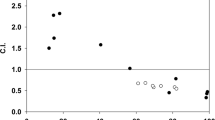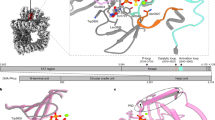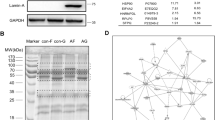Abstract
Enhanced repair of DNA adducts may be a cause of cis-diamminedichloroplatinum(II) resistance in solid malignancies. Binding of specific damage recognition proteins to the sites of DNA damage may be involved in the initial steps of DNA repair, or alternatively may block access of repair proteins to damaged DNA. Proteins which bind specifically to CDDP-modified DNA were identified in cell extracts from human ovarian carcinoma cell lines by two assays, the gel mobility shift assay and the southwestern blot. In the first assay, proteins complexed with CDDP-modified oligonucleotide and produced two retarded bands, B1 and B2. The B2 complex was partially purified from an ovarian cell extract by anion exchange FPLC, and was shown to bind to DNA damaged by CDDP but not by transDDP or UV irradiation. Using the southwestern blot, proteins of 97, 48, and 25 kD were identified; each of these bound to CDDP-modified but not undamaged oligonucleotide. The partially purified B2 protein fraction contained both the 97 and the 25 kD damage recognition proteins. A human ovarian carcinoma cell line selected in vitro for CDDP-resistance (OV1P/DDP), which is 5-fold more resistant to CDDP than the parental line (OV1P), showed an increase in binding of the 97 and 48 kD damage recognition proteins compared with the parental line. Twelve ovarian cell lines differed by up to 3-fold in their expression of these proteins, but there was no correlation between the amount of damage recognition protein in a cell extract and the cellular sensitivity to CDDP. Damage recognition proteins were also demonstrated in extracts prepared from biopsies of human ovarian, cervical, and testicular malignancies, but there was no apparent difference in the binding activity in extracts from tumours of different CDDP-sensitivity. The functional role of these damage recognition proteins remains to be established.
This is a preview of subscription content, access via your institution
Access options
Subscribe to this journal
Receive 24 print issues and online access
$259.00 per year
only $10.79 per issue
Buy this article
- Purchase on Springer Link
- Instant access to full article PDF
Prices may be subject to local taxes which are calculated during checkout
Similar content being viewed by others
Author information
Authors and Affiliations
Rights and permissions
About this article
Cite this article
Bissett, D., McLaughlin, K., Kelland, L. et al. Cisplatin-DNA damage recognition proteins in human tumour extracts. Br J Cancer 67, 742–748 (1993). https://doi.org/10.1038/bjc.1993.135
Issue Date:
DOI: https://doi.org/10.1038/bjc.1993.135



